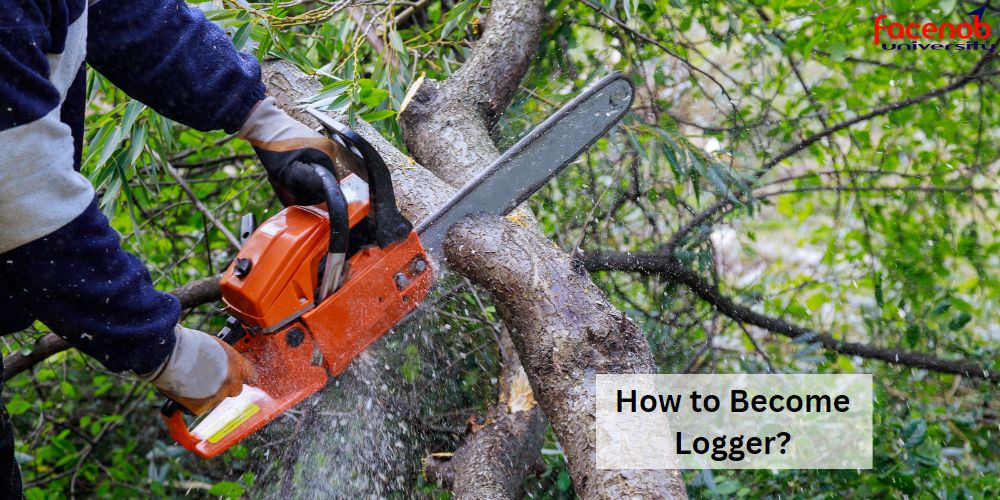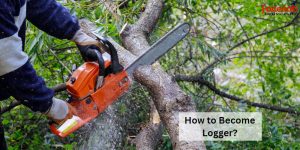How to Become Logger?

Introduction of Logger
The rough and powerful Loggers who harvest thousands of acres of forest annually are the primary creators of the numerous consumer and industrial items that are taken for granted worldwide.
Similar Job Titles
- Forestry Worker
- Timber Feller
- Timber Faller
- Choke Setter
- Bucker
- Rigging Slinger
- Rigging Chaser

Typical Job Responsibilities
What do Loggers do?
A Logger would typically need to:
- Harvest trees with heavy machinery and power tools so that the wood and other raw materials can be used to produce ordinary consumer items and industrial products.
- Before utilizing equipment, inspect it to ensure it is safe to use and complete basic maintenance activities.
- Clear undergrowth; cut down trees with hand-held chainsaws or mobile felling machines
- Drivmaneuveroeuvre feller-buncher tree harvesters to shear trees and cut logs into desired lengths
- Fasten cables or chains around logs to be dragged by tractors; operate machinery that pulls the logs to the landing or deck area.
- Separate logs by species and type of wood before loading them onto heavy-duty tractors or trucks
- Grade logs according to characteristics such as knot size and straightness
- Use conversion tables to calculate total board feet, c, cordage, or other wood measurement units
- Plant new tree seedlings; create drainage systems; thin, thickly forested regions; safeguard the forest from insect pests and illnesses; and avoid forest fires.
- Clear footpaths and nature trails; maintain car parks; put up fences, gates, signs, and public information notices
- Build new and maintain or repair existing logging road
- Check and maintain tools and equipment at the end of the workday
Standard Work Environment
Loggers operate in a physically demanding, remote, and potentially hazardous environment. They spend all of their time outside, exposed to the elements, while the growing use of covered machines and protective apparel lowers the suffering caused by inclement weather and makes logging a safer career.
Loggers typically work in groups of five to fifteen people. Some employers may offer workers bunkhouses at the logging camp to avoid the pain of commuting long distances if the job is in a sparsely populated area.
Work Schedule
The majority of loggers work 36 to 40 hours a week. As logging is a seasonal business and severe weather conditions impede their work, loggers may relocate or seek alternative employment for a portion of the year.
Employers
Seeking a new job may appear difficult. Loggers can improve their job search by soliciting referrals from their network, contacting firms directly, using job search platforms, attending job fairs, leveraging social media, and contacting staffing agencies.
Loggers are generally employed by:
- Public & Private Lumber Companies
- Public & Private Timber Companies
Unions / Professional Organizations
Professional organizations and groups, such as The Society for Conservation Biology and The International Society of Arboriculture, are essential for Loggers who want to further their professional growth or interact with other experts in their industry or employment. Participation in one or more of these organizations adds value to your resume while strengthening your credentials and qualifications.
Workplace Challenges
- High rate of occupational fatalities, often due to contact with a machine or log
- A physically challenging and dangerous work environment in remote forest areas out of service for phones and similar forms of communication
- Physically stressful work activities such as climbing and heavy lifting
- Constant sources of, danger, such as falling branches and vines, and a rough terrain
- The need to work in extreme heat or cold, snow or sleet, and on muddy ground
- Poisonous insects, plants, and animals that live in and around the logging site
- Loud, distracting noises
Suggested Work Experience
A good academic program for a future logger should involve field excursions to observe or participate in logging activities. They will help students grasp the specific nature of the profession as well as the physical strength and fitness required to accomplish it properly.
Enroll in approved training programs that include technical teaching or on-the-job training in best management practices, environmental compliance, and reforestation. Real-time training courses provided by your local government forestry or logging association may allow you to practice various logging techniques and use relevant equipment.
When your tasks outside of the classroom precisely align with your learning, you will benefit from them. When more experienced workers turn seemingly ordinary occurrences into unique learning experiences, you may hear endless stories from them and gain significant hands-on knowledge.
Apprenticeships as an arborist or forest operative and volunteering for a forestry or wildlife organization are other methods to get valuable expertise. A high school diploma and proficiency in English and maths may be required.
Furthermore, individuals participating in sports or experienced manual labor will appeal to companies looking for swift, strong workers willing to work outside. Several Loggers have also worked as production assistants or sales issues.
To demonstrate your devotion to course providers and possible employers, read about the profession and interview or job shadow specialists in logging.
Recommended Qualifications
Most firms will consider candidates with only a high school diploma. Nonetheless, there is a surge in the number of aspiring loggers looking for a recognized associate degree or certificate in forest technology from vocational and technical schools and community colleges to help them enter the sector.
Accredited foundation degrees, HNDs (higher national diplomas), and bachelor’s degrees in forestry, arboriculture, forest management, forest ecology, and conservation are available from several educational providers.
College certificate programs also cover land-based technologies, forestry and arboriculture, agriculture, land management, and production.
High scI hool emphasizes mathematics, physical and health education, computer applications, agricultural education, and natural resource management.
Certifications, Licenses, and Registration
Loggers may obtain several levels of certification based on the terms and conditions of their work.
You can progress to a postsecondary wood harvesting apprentice program after completing a four-day conventional certification for skidder and chainsaw operators, including a mandated core curriculum.
Prospective loggers will learn about worker’s comp and insurance, hazard communication, government harvesting legislation, fish and wildlife conservation, logging safety guidelines, chainsaw safety and maintenance, safe and efficient felling, safe skidding, and controlled yarding.
An ideal course includes fatigue and time management, transportation safety, evacuation planning, CPR and first aid training, bloodborne diseases, and kit inventory.
A customized on-site evaluation by an authorized evaluator who interviews the participant, examines their work practices, and scores them on areas ranging from job site safety to awareness of environmental standards determines qualification.
Potential Loggers can also choose a 16-hour interactive online training session that can be completed at the learner’s pace over 14 days. Students will study AED (automated external defibrillator), fire extinguisher safety, fire safety, hearing conservation, industrial ergonomics, and sexual harassment in addition to the topics stated above.
You will also learn about hand and portable powered tools, walking and working surfaces, overhead power lines, and the daily inspection of obligatory personal protection equipment (PPE), ROPS (rollover protection structure), FOPS (falling object protective structure), and seat belts.
You can also take advantage of logging firms’ and trade groups’ training programs for workers who want to operate huge, complicated machinery, and equ—that—the education provider awards state-recognized safety certification to successful candidates.
Accreditation from a reputable and objective organization might help you stand out in a competitive employment market and allow you to work independently as a consultant. Certification normally requires a mix of education, experience, and examination, though criteria vary by location. Successful certification programs protect public welfare by incorporating a Code of Ethics.
You may also be required to go through an employment background check, which includes, but is not limited to, a person’s work history, education, credit history, motor vehicle records (MVRs), criminal record, medical history, usage of social media, and drug testing.
Projected Career Map
Loggers’ careers are driven by performance, experience, and the acquisition of professional certifications. They may rise to roles where they maintain specialist logging equipment, become Truck/Tractor Drivers and Equipment Operators, or Supervise logging crews.
Loggers interested in wildlife conservation could become Forest Rangers and work alongside wardens or conservation officers to care for the local animals.
Job Prospects
Applicants with relevant postsecondary education, suitable certificates, and adequate experience have the best career prospects.
Beneficial Professional Development
Continued professional development (CPD) will assist an active logger in developing personal skills and expertise through work-based learning, professional activity, and formal educaSupposeon.
If traditional schooling or self-directed learning is used. It enables you to always improve your skills regardless of age, employment, or degree of expertise.
CPD also allows you to renew desired qualifications regularly after reviewing your knowledge and expertise in areas ranging from safety to environmental standards, depending on your certification category.
Loggers also want further training in file and downtime reduction, reducing residual stand damage for mechanical workers, and log bucking and use. After completing a field examination, they are invited to attend relevant training on best management practices, aesthetics, and trucking, which may contribute to re-certification.
Conclusion of Logger
Although the training required to pursue logging as a profession is rigorous, and the job itself is arduous and demanding, loggers as a race feel the benefits of working outdoors to be well worth the effort.
Advice from the Wise
Invest in a website where future customers can see your work’s quality.
Explore Also: How to Become Hydrologist?

I like this weblog very much, Its a rattling nice place to read and obtain info.Expand blog